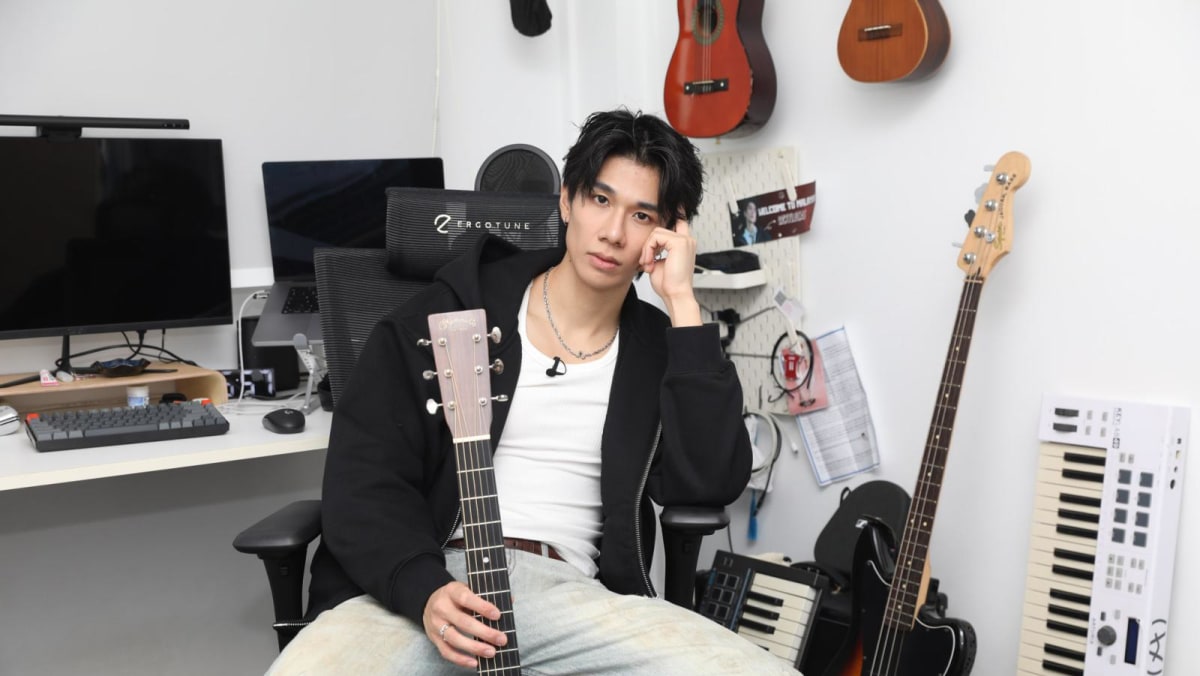In the quiet of his grey-toned childhood bedroom, 22-year-old Lucas Wang tinkered with original music on his laptop then paused to translate in Hokkien as he introduced me to his grandmother.
The second-year business student at the National University of Singapore has slipped back into a familiar rhythm – balancing school and home life with being a singer-songwriter under his stage name, WhyLucas, which is derived from his Chinese name’s initials.
Just a few months ago, his days were a blur of cameras and choreography under blinding stage lights as a finalist on Chuang Asia, a reality competition show filmed in Thailand where he vied for a spot in an international boy group.
Mr Wang competed on the Chinese-Thai show’s second season, which follows the “idol survival show” format popularised by K-Pop.
In such shows trainees mostly in their teens and early twenties battle it out in front of celebrity judges and global audiences. Their rankings shift each week based on performance and popularity.
One episode of Chuang Asia 2 drew more than 700,000 viewers on a livestream and videos of Mr Wang’s performances with fellow contestants have since racked up close to 800,000 views on social media.
Mr Wang, the only Singaporean contestant on the show, did not end up debuting in the seven-member group after ranking 18th out of 21 finalists in the final episode, but said the experience has changed his life. The show began with 60 trainees mostly from China, Thailand and Japan.
“Before going to Chuang, I would (always think), ‘Can I do this?’ But now the way I approach things is, ‘Do I want to do this?’ And if I want to do this, I’m not going to stop until I get something out of it,” said Mr Wang.
Since returning from Thailand, Mr Wang has picked up new fans from around the region, acquired a management team and has been approached to perform at music festivals because of the added exposure.
Being on a reality competition show taught him to push himself musically, after being exposed to the “amazing amount of talent from the world”.
Mr Wang grew up loving 2010s pop music, including the likes of Shawn Mendes, Taylor Swift and Adele. After coming across singer-songwriter John Mayer’s music in 2020, Mr Wang took influence from a more guitar forward, self-produced style of music and wanted to bring a “bluesy rock guitar style” to his own songs.
“I would say the music I’m creating now is still pop. But the kind of pop that feels so experimental but you would still add to your playlist not just because it’s trending, but because of its ageless, catchy melodies, production and guitar-playing,” he said.
Part of training to be a global idol includes learning to greet fans in multiple languages and Mr Wang’s self-introduction in Thai, Malay, Mandarin and English still rolls off his tongue with the ease of muscle memory.
During our interview, he gamely attempted a more localised version in the Hokkien.
Perhaps most Singaporean of all is the way he fumbles with the translation in the Chinese variety before popping out of the room to consult his parents and grandmother.
Moments later, he returns with a big smile and a bit more confidence in his greeting of “Dai gei ho”, saying in Hokkien, “Hi everyone, I’m WhyLucas”.
